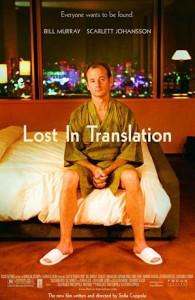Hotels are neutralizing. They exist as these in-between purgatorial vacation places, where you can pretend to live without the nagging burdens of modern life. You have a pool now, and a maid, and endless patterned hallways to explore, all filled with people who are only temporarily living in this halfway home for the well-off with you. Anything can happen in a hotel. You are a new person, in a new place where nobody knows you. This is the timeless in-between space that Lost in Translation takes place in and pulls its acerbic wit and quiet energy from, creating a nuanced, contemplative experience that dazzles with its emotional subtleties.
 The story of Lost in Translation is fundamentally simple. Bob Harris (Bill Murray) is an American film actor who has lived to see his glory days come and pass, along with the happiness of his marriage. His career is no longer defined by his skill as a performer, but by his marketability as a face that people remember fondly. He now finds himself in Tokyo starring in an ad campaign for a pronounced whiskey brand, away from home, surrounded by a language he doesn’t understand, on the verge of a mid-life crisis. Charlotte (Scarlett Johansson) is a recent college grad and the young wife of an up-and-coming photographer, tagging along on his job trip, caught between imposing existential and marital quandaries. Two wandering souls searching for meaning in a westernized, urban landscape. Their meeting place? A smoke-filled, burgundy-carpeted hotel lounge, overlooking the city with poetic, restrained arrogance. After glances grow into larger interactions, they discover that maybe the best way to find yourself in a culture that is not your own, is to be lost in it with someone else.
The story of Lost in Translation is fundamentally simple. Bob Harris (Bill Murray) is an American film actor who has lived to see his glory days come and pass, along with the happiness of his marriage. His career is no longer defined by his skill as a performer, but by his marketability as a face that people remember fondly. He now finds himself in Tokyo starring in an ad campaign for a pronounced whiskey brand, away from home, surrounded by a language he doesn’t understand, on the verge of a mid-life crisis. Charlotte (Scarlett Johansson) is a recent college grad and the young wife of an up-and-coming photographer, tagging along on his job trip, caught between imposing existential and marital quandaries. Two wandering souls searching for meaning in a westernized, urban landscape. Their meeting place? A smoke-filled, burgundy-carpeted hotel lounge, overlooking the city with poetic, restrained arrogance. After glances grow into larger interactions, they discover that maybe the best way to find yourself in a culture that is not your own, is to be lost in it with someone else.
It feels typical, soapy, even expected, but despite any attempt to make it sound like the tagline for Nicholas Sparks’ most recent cinematic offering, there should be no detraction from the quiet brilliance of Sophia Coppola’s vision of hopeful melancholy. Coppola has a deft understanding of film; from her drifting cinematography, to the subtle acting cues that shape the atmosphere of the film, everything is near-perfect. Yet the true beauty of the movie is in its narrative execution, in its ability to take the familiar and the occasionally cringe-inducing aspects of life and roll them into intricate character interactions that shine in their small moments and large alike.
Murray and Johansson are both tastefully, even impeccably cast. Murray bounces off of Johansson with a romantic charm that would be considered creepy if the film were in less capable hands. Yet their age difference is never an issue. If anything, it adds significantly to the spirit of what a hotel is: a timeless, ageless crossroads for people searching for fulfillment away from the comforts of home. This theme is crucial to understanding who these people are and why they would be vulnerable enough to approach one another in the first place. There is a youthful zeal to Bob’s antics, a sense of wonderment in Charlotte’s longing for purpose, and together they’re delightful in their tragic meeting. Despite the joy that they experience in their first quiet conversations at the hotel bar or in their escapades through the arcades of downtown Tokyo, there is always a knowing look of loss in their eyes. To each other, they are like beautiful relapses away from normal, and they both know that soon they will return to their homes and spouses again, and re-adjust. These things are never stated, only read. Read in the quaint eyebrow shifts, the mumbled trailing-off of loving sentences, the aching, intimate glances in the midst of open-mic karaoke. These are the moments that make Lost in Translation feel whole.
Lost in Translation speaks to a wistful transience, captured in its brittle, contemplative story of hotel guests transitioning from facelessness to fleeting connection. Just as a brief hotel stay, the experience exists in its own place, separated and distinct from the world, yet still familiar. And in the end, we must go home.

One reply on “Blast From The Past: Lost in Translation Review”
It’s Sofia Coppola. Not Sophia.